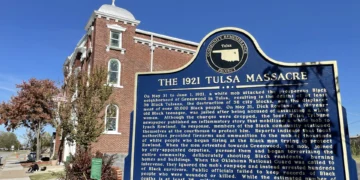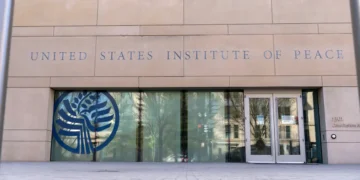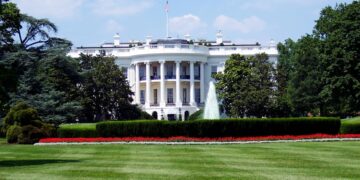A Black Lives Matter sign is displayed near the intersection of Emerson Street and Dodge Avenue in Evanston, Illinois, on March 19, 2021. Photo by Eileen Meslar/Reuters/File
June 16, 2024 Story by: Editor
A conservative group has filed a lawsuit against Evanston, Illinois’ reparations program, sparking concern among advocates that this may signal a wave of attacks on efforts to address the historical injustices faced by Black Americans.
The complaint, initiated by Judicial Watch, challenges the constitutionality of Evanston’s program, claiming it violates the Equal Protection Clause of the 14th Amendment by using race as a criterion for eligibility. This mirrors the legal tactics often used by conservative activists, especially in the wake of the Supreme Court’s decision to overturn affirmative action in college admissions.
As Juneteenth approaches, marking the end of slavery in the US, reparations advocates are bracing for more legal challenges. Nevertheless, they remain committed to addressing the long-standing effects of slavery, segregation, and systemic racism.
The Evanston program, which started in 2019, offers Black residents who lived in the city between 1919 and 1969, and their descendants, up to $25,000 in housing assistance. Robin Rue Simmons, chair of the Evanston Reparations Committee, emphasized the city’s readiness to defend the program, describing the lawsuit as an attack on the broader reparations movement and efforts toward racial equity and civil rights.
Judicial Watch’s lawsuit was filed on behalf of six individuals whose ancestors lived in Evanston during the covered period but do not identify as Black. The lawsuit argues that the program uses race as a proxy for experiencing discrimination without requiring specific evidence of such harm.
Judicial Watch President Tom Fitton condemned the program as a “brazen violation of the constitution and federal law,” asserting that benefits based on race are generally disfavored by courts.
Evanston officials have stated they will “vehemently defend” the reparations program. Justin Hansford of the National African American Reparations Commission countered Judicial Watch’s claims, highlighting that the targeted community historically faced racial discrimination and should thus receive justice.
Fitton indicated that more lawsuits against similar programs might follow. This legal challenge comes as various states and cities establish commissions to explore reparations distribution and eligibility.
The momentum for reparations and the establishment of Juneteenth as a federal holiday gained traction after George Floyd’s murder in 2020. However, four years later, reparations efforts face significant hurdles, exacerbated by the Supreme Court’s stance on affirmative action.
Recently, the Oklahoma Supreme Court dismissed a lawsuit seeking compensation for survivors of the 1921 Tulsa Race Massacre, and a federal appeals court blocked the Fearless Fund from awarding grants exclusively to Black women entrepreneurs.
Some reparations advocates are adopting more race-neutral approaches to avoid legal battles. Kamilah Moore, chair of California’s Reparations Task Force, mentioned their commission’s recommendation for a “lineage-based” approach, requiring proof of ancestors’ enslavement or free status before 1900. Moore believes this approach is constitutionally sound but acknowledges potential challenges.
California’s task force has also proposed reparations based on harms from housing segregation, mass incarceration, over-policing, devaluation of Black businesses, and health disparities. These recommendations await legislative approval.
In New York, Governor Kathy Hochul signed a bill to establish a reparations commission to study the impacts of slavery and propose measures to address long-standing inequities. Jennifer Jones Austin, a commission member, advocates for a holistic approach, including individual payments, community investments, and legal reforms.
Jones Austin expressed concern about legal challenges but is confident in the commission’s legal compliance. Areva Martin, a civil rights lawyer and reparations advocate, sees the lawsuit against Evanston as part of a broader, calculated effort by conservatives emboldened by recent judicial decisions. She urges resilience and continued advocacy.
Justin Hansford views the Evanston lawsuit as a rallying call for supporters of reparations, emphasizing the movement’s growing significance. Source: CNN
















